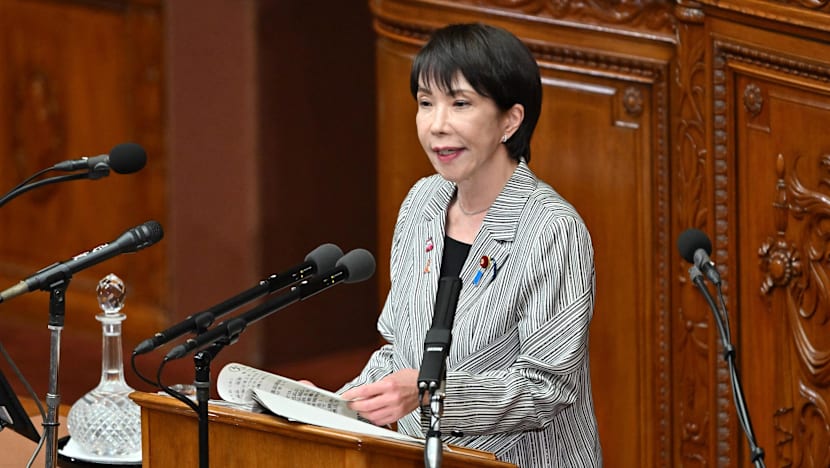World
Japan Dispatches Envoy to China Amid Rising Taiwan Tensions

Japan is sending a senior diplomat to China on November 17, 2023, to address escalating tensions between the two nations over Taiwan. The diplomatic row intensified following comments made by Japanese Prime Minister Sanae Takaichi, who indicated that a potential Chinese attack on Taiwan could threaten Japan’s national security and might provoke a military response. This statement marks a significant shift in Japan’s public discourse regarding its security policy, a subject officials have typically approached with caution due to Beijing’s claims over the self-governing island.
Masaaki Kanai, the director general of the Japanese foreign ministry’s Asia and Oceania bureau, is set to meet with his Chinese counterpart, Liu Jinsong. Reports from Japanese media suggest that Kanai will clarify Takaichi’s remarks, asserting that they do not reflect a change in Japan’s security stance. He is also expected to urge China to avoid actions that could further strain bilateral relations.
Beijing’s response to Takaichi’s comments has been swift and severe. On November 15, it warned Japan of a “crushing” military defeat if it attempts to intervene militarily in the Taiwan Strait. In a separate action, China summoned Japan’s ambassador to lodge a formal protest. Additionally, Chinese authorities have advised their citizens against traveling to Japan, raising fears of a potential decline in tourism that could impact Japan’s economy.
In a related statement, Taiwanese President Lai Ching-te described China’s actions as a “multifaceted attack” on Japan, undermining peace and stability in the Indo-Pacific region. He called on the international community to remain vigilant and urged China to act as a responsible major power, rather than a disruptive force. Lai’s administration continues to reject Beijing’s claims of sovereignty over Taiwan, reinforcing its commitment to maintaining the island’s democratic governance.
Chinese state media has also criticized Takaichi’s comments. The People’s Daily, the official newspaper of the Communist Party of China, labeled her remarks as “dangerous” and “strategic recklessness,” suggesting they were intended to provoke a reaction.
Economic analysts warn of potential repercussions from the diplomatic tensions. Takahide Kiuchi, an executive economist at the Nomura Research Institute, noted that a downturn in Chinese visitor numbers could mirror the 25 percent decline Japan experienced during a previous diplomatic spat in 2012. Such a decrease could have substantial negative effects, potentially stunting Japan’s annual economic growth by more than half, Kiuchi cautioned.
As Japan navigates these complex diplomatic waters, the upcoming meetings could play a crucial role in determining the trajectory of relations between these two influential nations in the region.
-

 Lifestyle4 months ago
Lifestyle4 months agoHumanism Camp Engages 250 Youths in Summer Fest 2025
-

 Business4 months ago
Business4 months agoKenvue Dismisses CEO Thibaut Mongon as Strategic Review Advances
-

 Sports4 months ago
Sports4 months agoDe Minaur Triumphs at Washington Open After Thrilling Comeback
-

 Top Stories4 months ago
Top Stories4 months agoColombian Senator Miguel Uribe Shows Signs of Recovery After Attack
-

 Sports4 months ago
Sports4 months agoTupou and Daugunu Join First Nations Squad for Lions Clash
-

 Health4 months ago
Health4 months agoNew Study Challenges Assumptions About Aging and Inflammation
-

 World4 months ago
World4 months agoASEAN Gears Up for Historic Joint Meeting of Foreign and Economic Ministers
-

 Business4 months ago
Business4 months agoOil Prices Surge Following New EU Sanctions on Russia
-

 Entertainment4 months ago
Entertainment4 months agoDetaşe-Sabah Violin Ensemble Captivates at Gabala Music Festival
-

 Entertainment4 months ago
Entertainment4 months agoBaku Metro Extends Hours for Justin Timberlake Concert
-

 Business4 months ago
Business4 months agoU.S. House Approves Stablecoin Bill, Sends to Trump for Signature
-

 Top Stories4 months ago
Top Stories4 months agoRethinking Singapore’s F&B Regulations Amid Business Closures









